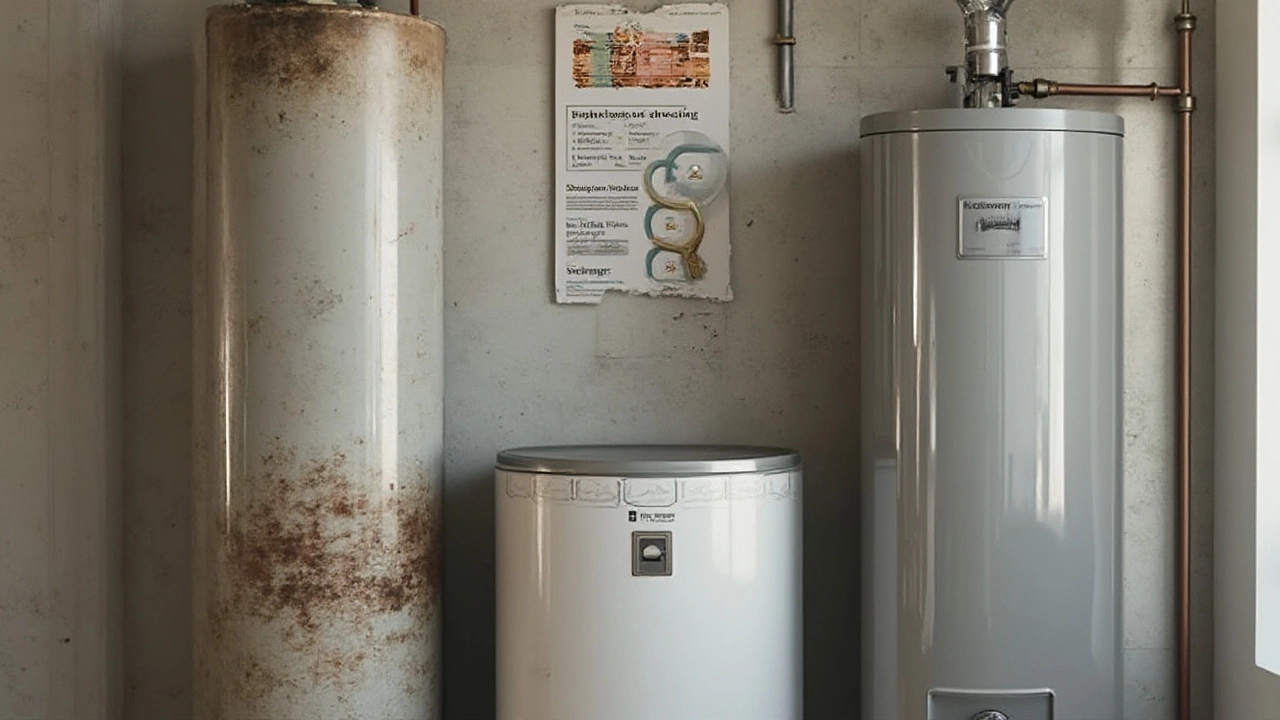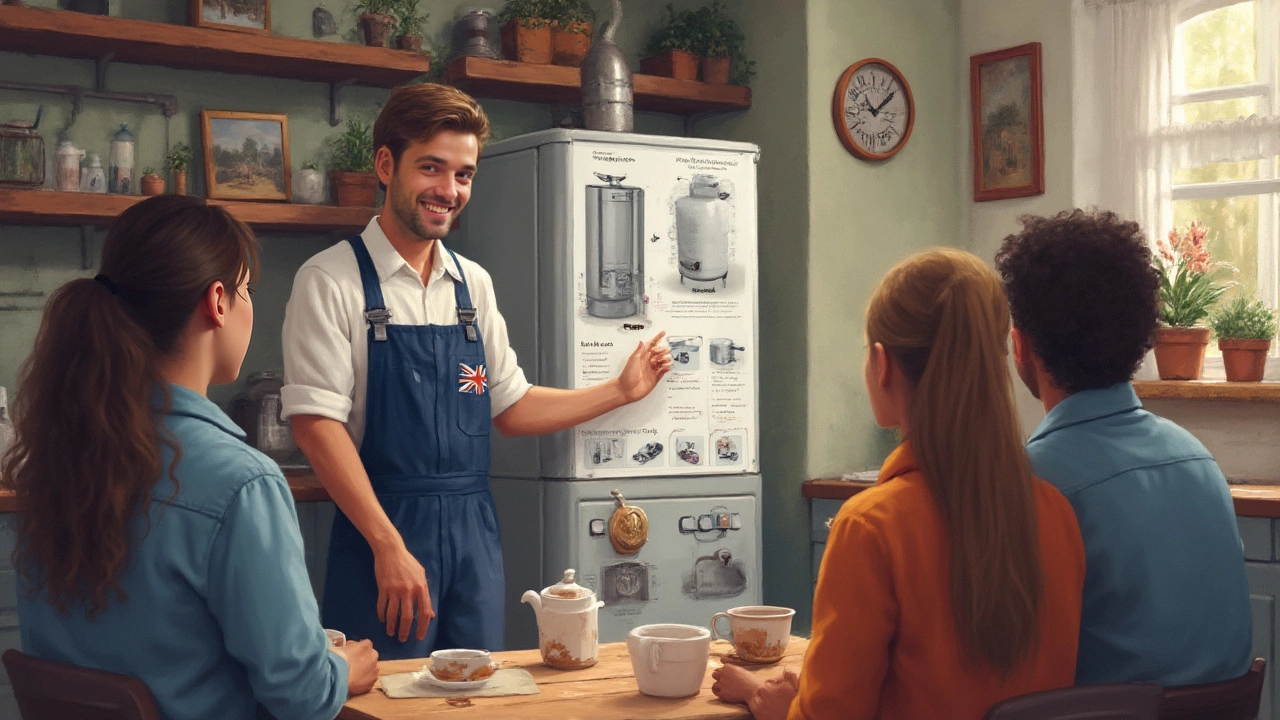Ever noticed how the hot water runs cold at the worst possible moment—usually when you’re all soaped up in the shower? Or maybe you’ve spotted a puddle under your old hot water tank and played dumb, hoping it would fix itself. Truth is, ignoring your water heater’s age is a classic mistake. Most of us never think about these hidden workhorses until something goes wrong. Here’s a surprise: your trusty hot water system probably won’t last as long as you’d like, whether it’s a tank or tankless unit.
What Impacts Water Heater Lifespan?
So, how long should a water heater last? There’s no single answer. It really depends on the type, the water quality, maintenance habits, and, believe it or not, even the climate you live in. Most standard tank water heaters run out of steam after about 8 to 12 years. That’s just the average though. If you’re rocking a tankless system, you’re looking at a cool 15 to 20 years, and sometimes even more if you treat it right.
Location matters more than you might think. For instance, in places with hard water—looking at you, most of New Zealand (Dunedin’s water is relatively soft though, lucky for some)—mineral buildup can cut years off your heater’s life. The minerals cause sediment to collect, especially in the bottom of tank heaters, mucking up efficiency and eventually leading to corrosion. If you skip out on regular flushing and basic checks, don’t be surprised if your water heater taps out early.
The brand and build quality make a real difference too. Cheaper models with thinner anode rods (that’s the part that stops the tank from rusting) don’t stand a chance next to premium units. Environmental factors, like salty coastal air or aggressive mains pressure, also chip away at the lifespan. Sometimes it comes down to bad luck—maybe you just got a lemon.
Check the manufacture date—usually coded on a sticker or plaque near the pipes. If you’re already a decade in and haven’t done much for your heater, it might be time to start planning for a replacement. Don’t rely on the "if it ain’t broke, don’t fix it" approach. Hot water disasters love to strike when you least expect them.
Here’s a quick look at average water heater lifespans based on type and basic maintenance, in handy table form:
| Heater Type | Average Lifespan (Years) | Maintenance Required? |
|---|---|---|
| Standard Tank (Electric) | 8–12 | Flush annually, check anodes |
| Standard Tank (Gas) | 8–12 | Flush annually, check anodes |
| Tankless/On-demand | 15–20+ | Descale yearly, clean intake filter |
| Heat Pump Hybrid | 10–15 | Clean air filter, check condensate drain |
How to Tell If Your Water Heater Is Near the End
It’s tempting to baby your old water heater forever, crossing your fingers every time you flick on the tap. But the warning signs are usually pretty clear if you’re paying attention. First up, age. If your tank water heater is over a decade old, you’re already on borrowed time. Same goes for tankless units pushing past eighteen years. Doesn’t matter if it’s still “working”—problems can sneak up fast.
Watch out for changes in water temperature or pressure. That classic “lukewarm, then cold” situation often means the heating elements are wearing out or the tank is getting choked by sediment. Strange popping or rumbling noises? That’s sediment heating and exploding inside the unit—think of it as the heater’s way of grumbling about its job.
Rusty or discolored water is a red flag the tank’s developing corrosion inside. Next step: leaks. Even a tiny drip at the base means the inner lining’s gone and water is seeping through. At that point, repairs usually aren’t worth it—especially for standard tanks.
Don’t forget about energy bills. A tank choked with sediment or one running full tilt just to heat a few liters of water can cost you hundreds over a year. Higher bills with zero changes in use? That’s your water heater crying for help.
- Sudden drop in hot water (heats less than before)
- Noisy operation or popping sounds
- Leaks or puddles forming under the heater
- Rusty or cloudy water from hot taps
- Higher than usual electricity or gas bills
- Visible corrosion around pipes or tank joints
If you’ve checked three or more from this list, your heater is waving a big red flag. Don’t push your luck—it’s time to start thinking about a new one before you end up with a cold shower on a frosty Dunedin morning.

Ways to Extend Your Water Heater’s Life
Want to squeeze every last year out of your water heater? Maintenance is where it’s at. For traditional tank systems, flushing once a year can make all the difference. You’ll be rinsing out that grimy layer of minerals before they harden into a crusty slab at the bottom. Trust me, it sounds like a pain but it’s a simple process (just follow the manual or YouTube it—lies in the details!).
The anode rod is your heater’s secret weapon. This long metal rod attracts all the nasty minerals, sacrificing itself so the actual tank stays rust-free. Get it checked every couple of years—swap it out when it’s lost most of its bulk. If you skip this, corrosion will chew through the tank way sooner.
For tankless systems, descaling is key, especially if your water has a lot of minerals. Hard water clogs those narrow heating coils and turns a high-tech unit into an expensive paperweight. Follow the manufacturer’s cleaning instructions on the dot. Usually, it just takes a vinegar flush once a year and a quick clean of the air filter.
Keep an eye on outside factors too. If the heater’s in a chilly garage or under the house, consider wrapping it in an insulating blanket. This keeps energy use down and makes parts last longer. And if your system runs off gas, calling in a pro for an annual check means you’ll spot leaks or dangerous problems before they get serious. Sounds boring, but it’s worth it.
- Flush water tanks annually to clear out sediment.
- Test your pressure relief valve at least once a year.
- Check and replace anode rods every 2-3 years.
- Descale tankless heaters with vinegar or proper cleaner yearly.
- Wrap the heater with an insulating blanket if it’s in a cold spot.
- Get a plumbing pro to look things over every few years—especially for gas or hybrid units.
Even something as simple as turning down the thermostat to 120°F (49°C) can slow down corrosion and save you cash. And don’t skimp on water quality. Installing a water softener where hard water is a problem protects every water-using appliance in the house, not just the heater.
You won’t find a magic fix, but these habits can add years to your heater’s life. The trick is regular checks—ten minutes now can save you hundreds and big headaches later.
When to Repair vs. When to Replace
Nobody wants to shell out for a pricey new heater if a simple repair will do the trick. But how do you know when it’s really done for? Here’s the deal: if your tank is less than seven years old and the problem’s minor—like a busted thermostat or a leaky valve—a repair usually makes sense. These fixes are quick and cheap. But if you’re seeing rust, major leaks, or heating elements constantly breaking, you’re probably throwing good money after bad.
The big warning is leaks from the tank itself. Surface drips from pipe fittings or valves can be fixed, but water leaking from underneath usually means the steel shell has corroded through. That’s a lost cause for any tank-type water heater. For tankless units, constant error codes, recurring shutdowns, or expensive part failures beyond warranty age can signal it’s time to move on. Sometimes the repair cost gets close to the price of a new, more efficient model.
If your energy bills are creeping up, it’s a sign your “fixes” are masking deeper problems. Newer models use way less energy—swapping out a dying tank can pay for itself in two or three years. And with government rebates (in NZ, check for EECA support) and better tech, now’s the time to consider it.
- If the cost to repair is more than 50% of a new heater, go for replacement.
- Heaters older than 10 years (tank) or 18 years (tankless) are best replaced.
- If you notice corrosion, leaks from the base, or repeated loss of hot water, think replacement—not repair.
- Any sign of unsafe operation (fumes, gas leaks, carbon monoxide alarms): turn it off and replace right away.
- Major improvements in efficiency or capacity needs are good excuses to upgrade now instead of patching up old tech.
One last thing: new heaters come with warranties that run from 6 to 12 years. The sweet spot is the models with longer warranties—they often use better parts and will last longer. And nothing beats that feeling of endless hot showers on a winter morning.

Choosing Your Next Water Heater: Key Features to Consider
Stuck choosing between another tank or trying the tankless trend? Each has upsides—and plenty of trade-offs. Traditional tanks are reliable, simple, and usually less expensive up front. If you have a big family and loads of hot water demand at once, a standard electric or gas tank in the 180-300L range might make sense. But they use more energy keeping water hot 24/7, even when you don’t need it.
Tankless heaters, on the other hand, give you hot water only when you ask for it. They’re efficient and last longer, and they take up barely any room on the wall. If you want to free up floor space or don’t use loads of hot water all at once, they can be a smart play. Just budget for the higher upfront cost (and make sure your piping and electrical panel can handle the swap).
Hybrid heat pump systems are getting popular in places like New Zealand, too. These draw warmth from the air to heat your water, making them incredibly efficient. They’re not ideal for really cold spots or uninsulated garages, but the energy savings are massive if you can use them. Solar hot water systems are worth considering if you’ve got plenty of Dunedin sun and want to slash power bills—just remember they work best with a backup heater for cloudy weeks.
Here’s what you’ll want to think about before you commit:
- Your local water quality (hard/soft, high mineral content)
- The number of people (or showers) in your house
- Space and installation challenges (tankless vs. big cylinder)
- Energy source (electric, gas, solar, heat pump hybrid)
- Warranty length and reputation of the brand (pay a bit more for peace of mind)
- Annual maintenance requirements (are you really going to flush it every year?)
Don’t fall for the cheapest option if you want something that’ll last. Spending a little more up front for a model with a longer warranty, a water heater lifespan that matches your plans, and better support pays off.
Want my advice? Keep all paperwork, lock in annual calendar reminders for maintenance, and write the install date right on the unit in big bold numbers. Trust me, your future self will thank you when you’re not scrambling through old paperwork next time the hot shower cuts out.
Hot water heaters are one of those things you don’t truly appreciate until you’re left with a freezing cold shower and a desperate dash for a kettle. Stay ahead of your water heater’s clock, invest time in maintenance, and make your next upgrade count—the difference in comfort, cost and reliability are real.
